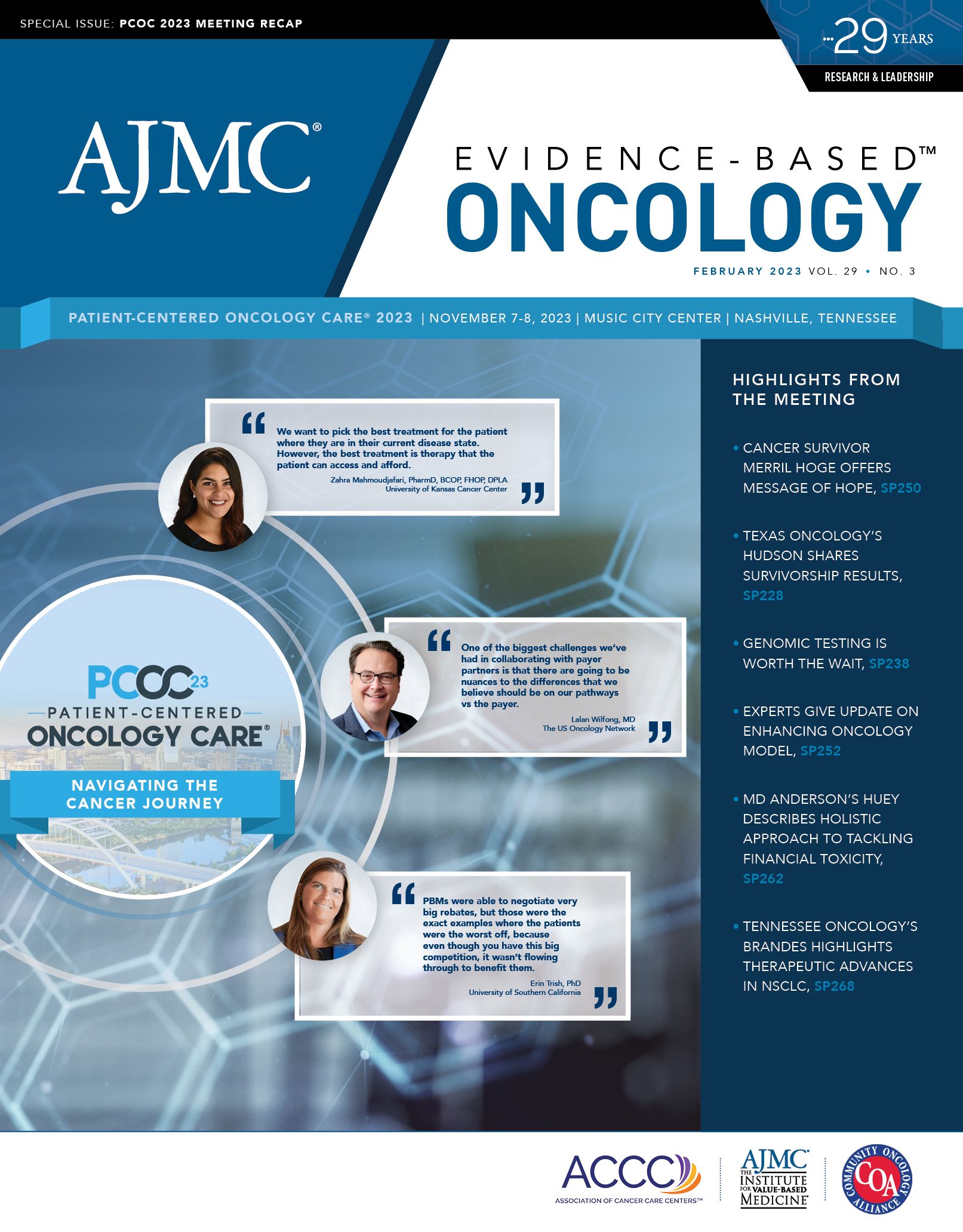
- Center on Health Equity & Access
- Clinical
- Health Care Cost
- Health Care Delivery
- Insurance
- Policy
- Technology
- Value-Based Care
Texas Oncology’s Hudson Shares How ePROs Helped Reduce Cost of Care
Kathryn E. Hudson, MD, of Texas Oncology was a featured speaker at Patient-Centered Oncology Care 2023.
Implementing a system to electronically collect patient-reported outcomes (ePROs) helped Texas Oncology cut the cost of care by $1146 per patient per month, with savings seen on inpatient stays, fees to skilled nursing facilities, and physician costs,1 according to Kathryn E. Hudson, MD, director of survivorship at the practice.
Kathryn E. Hudson, MD | Image: Texas Oncology

Hudson outlined results from the Texas Two-Step study1,2 to lead off the 2023 meeting of Patient-Centered Oncology Care, The American Journal of Managed Care’s annual multistakeholder gathering of cancer care leaders held November 7-8 in Nashville, Tennessee. The study had just been presented at the American Society of Clinical Oncology (ASCO) Quality Care Symposium.
Ethan Basch, MD, MSc, chief of the Division of Oncology and physician-in-chief for the North Carolina Cancer Hospital at the University of North Carolina School of Medicine, has championed research showing ePROs can improve cancer care while saving money,3 and he worked with Texas Oncology on its program. Basch had presented results at an ASCO plenary session in 2017, which Hudson said “showed that collecting ePROs improved quality of life and also overall survival, which was mind-blowing to people like me.”
As Hudson explained, an ePRO system accomplishes several things at once. It helps clinicians stay abreast of patients’ symptoms between visits so problems can be managed before they trigger a hospital stay. And ePROs help keep patients on their medication, both by reminding them to take oral drugs and by highlighting barriers to adherence. To develop its ePRO tool, Hudson said, Texas Oncology worked with the biotech company Navigating Cancer.
“Our goal is to make sure we’re reaching the appropriate patients,” Hudson said. A good ePRO system should be embraced by patients and providers alike and it must be implemented correctly so that it can be sustained. Texas Oncology’s tool used modified PRO-Common Terminology Criteria for Adverse Events technology4 “to ensure simplicity for patients and also consistency for data capture,” she said, sharing examples of questions such as “What side effects have you been dealing with for the last 7 days?” and “How much does pain interfere with your usual or daily activities?”
Research shows that this matters because a patient’s interpretation of symptoms may not match the physician’s, Hudson said. Texas Oncology’s program incorporated a daily question on medication adherence, which nurses could send via text at the time of day that matched patients’ individual schedules. If a patient doesn’t take medication or if a symptom changes from moderate to severe, an alert goes to the practice’s nurse triage team, and a nurse calls the patient to address the problem.
Texas Oncology launched its ePRO study in 2020, during the pandemic, with the period July to December 2020 covering a 6-month period of the Oncology Care Model (OCM), CMS’ prior advanced alternative payment model for cancer care. Today, the OCM successor, the Enhancing Oncology Model, requires practice to implement ePROs,5 which was a point of friction for some practices.
Hudson outlined key data points from the first part of the study,2 which aimed to evaluate whether patients and providers could work with the tool. The practice enrolled 4375 patients; 65% were women, which matches the patient population of the overall practice. Of the study population, 74% used the tool for reporting symptoms only; 26% used it for symptom management and oral medication adherence. Nearly a quarter (24%) of the patients lived at least 20 miles from the nearest clinic. According to the abstract, 64% of the patients’ weekly ePRO symptom assessments were completed; however, data showed that after 10 weeks, adherence fell from 72% to 52%.2
The second part of the study evaluated the program’s effectiveness by studying 458 patients in matched pairs (229 per group), culled from 831 patients with metastatic cancer.1 Results showed the tool improved individual patient care while generating important data on symptom patterns, which Hudson shared in a series of graphs. “You can see how this really lends itself to a nursing algorithm, to reach out to the patient and help them manage constipation or diarrhea,” she said.
According to the study, data from phase 2 showed the following1:
- 52% of the patients were male, with a mean age of 74 years.
- Mean total AEs were lower in the study group compared with the control (0.98 vs 1.41; P = .007), along with decreased hospitalizations (20% vs 32.5%; P = .002), emergency department (ED) visits (38.4% vs 42.3%; P > .05), and deaths (11.8% vs 16.6%; P > .05).
- For the study group, the average number of hospitalizations was lower (0.28 vs 0.52; P = .003) and hospital stays were shorter (1.9 vs 3.2 days; P = .03).
Although patient acceptance and satisfaction with the tool were high overall, with 70% saying they found it helpful, Hudson noted that providers were less enthusiastic in the first phase, with only 60% reporting it was helpful. The first phase also showed some physicians did not initially follow up on ePRO reports during patients’ clinic visits.
Also, only 5% of the patients reported Spanish as their first language, which Hudson said likely does not match the practice population. Use of the tool was also uneven across the state, with patients in the Gulf region being less likely to use it.
Hudson was candid about the challenges: “No. 1 is the burden on nursing: It certainly increases nursing workload. We really had to invest time and resources into our nursing triage teams. And that took a lot of work, especially during the pandemic, at a time where a lot of nurses [were] resigning.”
Also, the tool does not “seamlessly integrate” into the practice’s electronic medical record, something that Texas Oncology hopes to address. Full integration would someday allow questions about symptoms to be more customized, based on the patient’s type of cancer.
Finally, Hudson said right now, the tool does not track mental health symptoms because the practice cannot fully respond to these reports.
During the question-and-answer session, Hudson agreed that some patients lack access to broadband technology and may not be able to afford a smartphone for texting. She suggested that it is still valuable to collect their ePRO data on an iPad in the office ahead of their clinic visit.
Many early challenges can be addressed with better patient and provider education, Hudson said. “We have to make sure that patients of all languages can use our tool,” she said. “We have plan to further drive compliance and engagement.”
Adjusting check-ins to align with patients’ chemotherapy schedule is another planned improvement, as is a plan to let patients report their symptoms but opt out of a phone call. Changing symptom descriptions from “moderate to severe” to “worsening” would reduce calls to patients who are likely to have a heavier symptom burden throughout their treatment course.
“ePROs can be implemented successfully in a large community practice,” Hudson concluded. “We have shown that ePROs can reduce the number of ED visits, hospitalizations, and total cost of care.”
References
1. Patt DA, Patel AM, Bhardwaj A, et al. Impact of remote symptom monitoring (RSM) with electronic patient-reported outcomes (ePRO) on hospitalization, survival, and cost in community oncology practice: the Texas Two-Step study. JCO Oncol Pract. 2023;19(suppl 11):569. doi:10.1200/OP.2023.19.11_suppl.569
2. Patt D, Wilfong L, Hudson KE, et al. Implementation of electronic patient-reported outcomes for symptom monitoring in a large multisite community oncology practice: dancing the Texas two-step through a pandemic. JCO Clin Cancer Inform. 2021;5:615-621. doi:10.1200/CCI.21.00063
3. Basch E, Deal AM, Dueck AC, et al. Overall survival results of a trial assessing patient-reported outcomes for symptom monitoring during routine cancer treatment. JAMA. 2017;318(2):197-198. doi:10.1001/jama.2017.7156
4. What is the PRO-CTCAE system? National Cancer Institute. Updated March 6, 2023. Accessed January 22, 2024. https://healthcaredelivery.cancer.gov/pro-ctcae/overview.html
5. Enhancing Oncology Model. CMS. Accessed November 26, 2023.
https://www.cms.gov/priorities/innovation/innovation-models/enhancing-oncology-model

Oncology Onward: A Conversation With Dr Debra Patt of Texas Oncology
August 1st 2023Debra Patt, MD, PhD, MBA, joins hosts Emeline Aviki, MD, MBA, and Stephen Schleicher, MD, MBA, for episode 2 of our newest podcast, "Oncology Onward: Conversations With Innovators and Changemakers in Cancer Care."
Listen
Oncology Onward: A Conversation With Dr Debra Patt of Texas Oncology
August 1st 2023Debra Patt, MD, PhD, MBA, joins hosts Emeline Aviki, MD, MBA, and Stephen Schleicher, MD, MBA, for episode 2 of our newest podcast, "Oncology Onward: Conversations With Innovators and Changemakers in Cancer Care."
Listen
2 Commerce Drive
Cranbury, NJ 08512
AJMC®
All rights reserved.